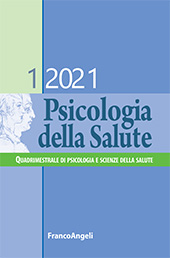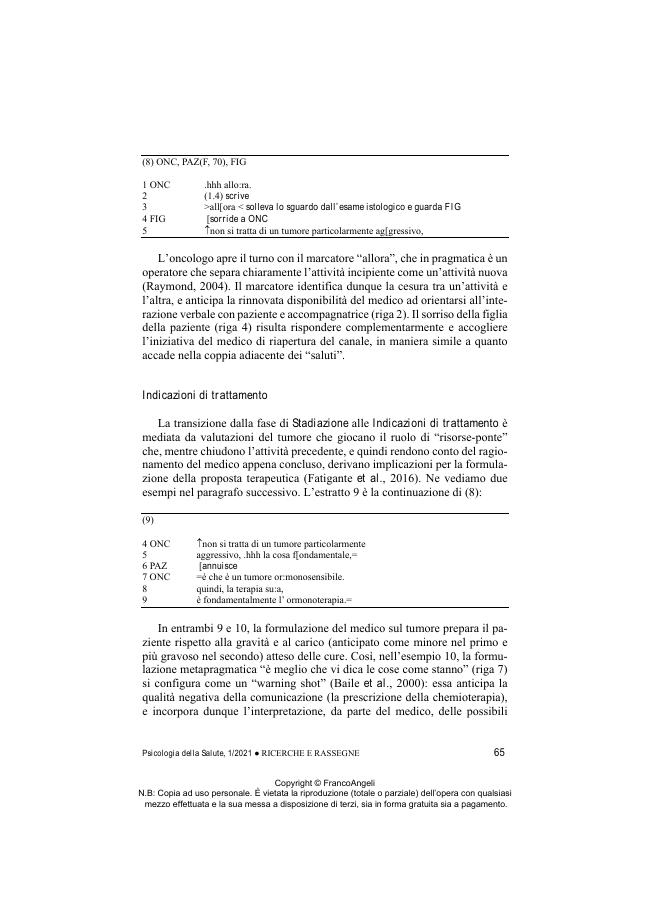La struttura della prima visita oncologica : uno studio conversazionale
53-77 p.
La prima visita in oncologia è un evento istituzionale (Drew e Heritage, 1992) altamente complesso sia per medico che per paziente e accompagnatori coinvolti. Il lavoro presenta uno studio conversazionale su un corpus di prime visite oncologiche volto all'esame delle distinte fasi che compongono questo evento. Il corpus di dati è costituito da 36 video registrazioni di visite oncologiche, condotte da due oncologi senior in due differenti ospedali romani. Lo studio aderisce alla prospettiva teorico-metodologica dell'Analisi Conversazionale (Schegloff, 2007), in particolare applicata al contesto medico (Heritage e Maynard, 2006). A partire da indicatori empirici discorsivi e multimodali, sono state identificate 8 fasi attraverso le quali, con diverse durate e complessità, si realizza la visita oncologica: Apertura, Anamnesi, Presentazione della malattia, Stadiazione, Indicazione di trattamento, Prescrizioni e Chiusura.
L'analisi qualitativa mostra come paziente e accompagnatore si orientino ai passaggi tra fasi distinte, cooperando con il medico ad assolvere la specifica agenda di attività della visita. Sono discusse le implicazioni dello studio per la ricerca e la comprensione delle forme di partecipazione e strategie di empowerment disponibili ai pazienti per fronteggiare la complessità comunicativa dell'incontro con l'oncologo e ridurre possibili stati d'ansia che si associano a questo evento. [Testo dell'editore].
The first visit in oncology is an institutional event (Drew and Heritage, 1992), highly complex both for the doctor and the patient. The paper presents a study on a corpus of first oncological visits and it examines the distinctive stages of this event. The data corpus is consti-tuted by 36 videorecordings of oncological visits, conducted by two senior oncologists in two different hospitals in Rome. The study is conducted within the Conversation Analytic perspec-tive (Schegloff, 2007), particularly applied to the medical context (Heritage and Maynard, 2006). Relying on discursive and multimodal markers, 8 stages have been identified, of differ-ent lenght and degree of complexity, along which the visit unfolds: Opening, History taking, Cancer problem presentation, Stadiation, Treatment recommendation, Prescriptions and Closing.
The qualitative analyses show how patients and companions (when present) orient to these boundaries and to relevant transitions between stages, thus cooperating with the doctor in the accomplishment of the specific agenda of the visit. Implications of the study are discussed for the study and understanding of the forms of participation and empowerment strate-gies available to patients to cope with the communicative complexity of the encounter with the oncologist and with the potential anxiety accompanying this event. [Publisher's text].
Forma parte de
Psicologia della salute : quadrimestrale di psicologia e scienze della salute : 1, 2021-
Artículos del mismo número (disponibles individualmente)
-
Información
Código DOI: 10.3280/PDS2021-001005
ISSN: 1972-5167
MATERIAS
KEYWORDS
- Comunicazione medico-paziente, prima visita oncologica, fasi, partecipazione del paziente, accompagnatore, Analisi della Conversazione
- Doctor-patient communication, first oncological visit, stages, patient's participation, companion, Conversation Analysis



